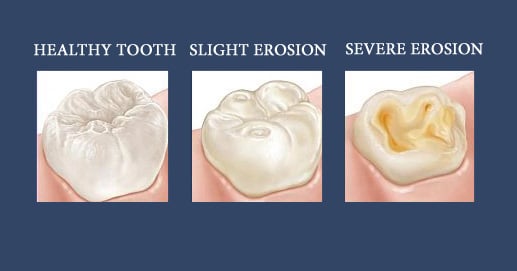Erosion is the loss of tooth enamel caused by acid attack.
Enamel is the hard, protective coating of the tooth, which protects the sensitive dentine underneath. When the enamel is worn away, the dentine underneath is exposed, which may lead to pain and sensitivity.
Causes of tooth erosion
- Excessive soft drink consumption (high level of phosphoric and citric acids)
- Fruit drinks (some acids in fruit drinks are more erosive than battery acid)
- Dry mouth or low salivary flow (Xerostomia)
- Diet (high in sugar and starches)
- Acid reflux disease (GORD)
- Gastrointestinal problems
- Medications (aspirin, antihistamines)
- Genetics (inherited conditions)
- Environmental factors (friction, wear and tear, stress, and corrosion)

Types of tooth erosion
Friction, wear and tear, stress, and corrosion (or any combination of these actions) can cause erosion of the tooth surface.
More clinical terms used to describe these mechanisms include:
- This is natural tooth-to-tooth friction that happens when you clench or grind your teeth such as with bruxism, often occurring involuntary during sleep.
- This is physical wear and tear of the tooth surface that happens with brushing teeth too hard, improper flossing, biting on hard objects (such as fingernails, bottle caps, or pens), or chewing tobacco.
- This occurs from stress fractures in the tooth such as cracks from flexing or bending of the tooth.
- This occurs chemically when acidic content hits the tooth surface such as with certain medications like aspirin or vitamin C tablets, highly acidic foods, GORD, and frequent vomiting from bulimia or alcoholism.
Prevention of tooth erosion
To prevent enamel loss and keep teeth healthy, be sure to brush and floss teeth daily. See your dentist every six months for regular checkups and cleaning. You can also try the following:
- Eliminate highly acidic foods and drinks from your diet such as carbonated sodas, lemons, and other citrus fruits and juices. Rinse your mouth immediately with clear water after eating acidic foods or drinking acidic drinks.
- Use a straw when you drink acidic drinks. The straw pushes the liquid to the back of your mouth, avoiding your teeth.
- Monitor snacks. Snacking throughout the day increases the chance of tooth decay. The mouth is acidic for a few hours after eating foods high in sugar and starches. Avoid snacking unless you’re able to rinse or brush teeth.
- Chew sugar-free gum between meals. Chewing gum boosts saliva production up to 10 times the normal flow.
- Drink more water throughout the day, especially if your mouth is dry
- Use fluoride toothpaste.
Treatment for tooth erosion
Treatment of tooth enamel loss depends on the problem. Once the enamel of a tooth is lost, it cannot be replaced naturally. With a strict remineralisation regime, tooth enamel loss may be limited and no further treatment will be required. Sensitive toothpaste may be used to manage any discomfort.
Please refer to the “Tooth erosion remineralisation” section in the “Existing patient treatment instructions” tab for a detailed regime for tooth erosion.
Sometimes fillings may be placed to protect the tooth and increase cosmetic appearance. If the enamel loss is significant, the dentist may recommend covering the tooth with a crown. The crown may protect the tooth from further decay.
